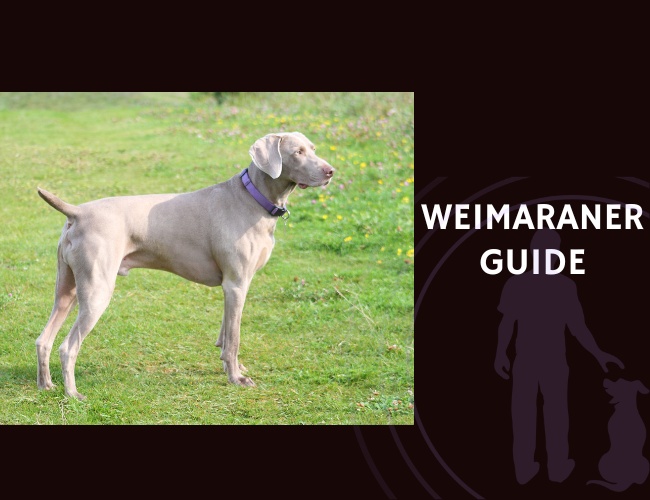Introduction to the Weimaraner Breed
A legacy rooted in German hunting tradition
The Weimaraner boasts a storied background as a German hunting dog, first bred to track and capture game across forests and fields. This rich heritage gave rise to a unique dog with abilities shaped for both speed and endurance. Bred to work alongside people, Weimaraners developed an impressive set of physical and mental traits that continue to define the breed today.
Key traits that set them apart
Weimaraners shine in both ability and spirit. A few hallmarks of the breed include:
- Stamina: Developed for day-long hunts, these dogs have impressive endurance and can outlast many other breeds.
- Prey drive: Their strong instinct to track and pursue small animals remains, so supervision is often needed around wildlife and smaller pets.
- Vigilance: Weimaraners are alert and always on the lookout, making them excellent watchdogs without being unnecessarily aggressive.
- Loyalty: These dogs form strong, close-knit bonds with their family. Their devotion is evident in their eagerness to stay close and their desire to please.
Special considerations at home
The Weimaraner’s wonderful qualities do come with unique needs. Their deep loyalty creates a powerful attachment to their humans, meaning they often do not cope well when left alone for long stretches. This trait can lead to separation anxiety and may result in unwanted behaviors if their social and emotional needs are not met.
High energy levels call for daily exercise and challenges—mental as well as physical. Without enough activity, a Weimaraner may become restless, vocal, or even destructive. Their prey drive also means that careful introductions are needed with smaller pets in the home.
Families seeking a four-legged companion will find that Weimaraners do best in active, attentive households. Their need for engagement and companionship is as important as their love for adventure.
With a thoughtful, committed approach, the many gifts of this breed come to life. Understanding their roots is key to building a strong, rewarding partnership.
Character & Behavioral Profile
Emotional intelligence and social nature
Weimaraners are celebrated for their remarkable social intelligence and emotional sensitivity. These dogs quickly form strong bonds with their humans and are highly attuned to mood and routine changes in the home. Their perceptive nature means they often anticipate their owner’s emotions, acting as loyal companions who seek involvement in all family activities. This strong attachment is a legacy of their pack-oriented hunting background, where teamwork and trust were vital.
However, with this deep bond comes a level of emotional vulnerability. Weimaraners are prone to heightened stress in unfamiliar or overwhelming environments. New people, loud noises, or changes to their surroundings can easily cause them anxiety. They thrive in predictable settings where security and companionship are always present. Early exposure to different experiences—like new sights, sounds, and people—can help bolster their confidence as they mature.
Common behavioral challenges
Because of their strong need for connection, Weimaraners often face behavioral challenges if left alone too long. Separation anxiety is a common concern, typically showing up as barking, destructive chewing, or even attempts to escape. This breed’s sensitivity and pack drive make long absences from their humans especially tough. Boredom can add fuel to the fire, leading to digging, howling, or other attention-seeking behaviors.
Their clever brains and curiosity mean everyday routines can get boring fast. Without enough mental and physical stimulation, these dogs quickly look for their own entertainment—usually in ways owners do not appreciate!
Hunting heritage in the home
The Weimaraner’s roots as a German hunting breed explain much of their modern behavior. High stamina, keen alertness, and a powerful prey drive remain constant. At home, these qualities show up as watchfulness and energetic play, but can also bring challenges. Their prey drive can lead to chasing smaller animals or responding intensely to unfamiliar scents and movements—sometimes ignoring commands in the heat of the moment.
Understanding the breed’s background helps owners provide clear boundaries while celebrating their spirited, affectionate nature. With time and careful guidance, Weimaraner families experience a deep, responsive bond that is both rewarding and unique.
Ready to help your Weimaraner reach its full potential? The right approach makes all the difference in establishing a balanced, happy partnership.
Training & Education Essentials
Positive Reinforcement: The Smart Approach
Training a Weimaraner asks for patience, consistency, and compassion. Their social intelligence and emotional sensitivity mean harsh training can cause stress or anxiety. Instead, positive reinforcement works best. Reward good behavior with treats, praise, or playtime. This breed craves approval and quickly learns when training feels fun and engaging. Setting clear, kind boundaries helps them know what’s expected.
Keeping Their Minds Busy
Weimaraners are clever and active, so mental stimulation is just as important as physical exercise. Without enough brain challenges, boredom can lead to barking, digging, or destructive chewing. You can mix up their routine with:
- Puzzle toys
- Scent work games
- Hide-and-seek or treat searches
- Simple trick training
These activities keep their focus and channel their energy positively. Mental exercise keeps their mind healthy and lessens the risk of behavioral burnout.

Early Socialization: Building Social Skills
Introducing your Weimaraner puppy to new experiences early is essential. Start by exposing them to friendly people, children, other dogs, and different places. Supervise these adventures and keep them positive by rewarding calm, curious behavior. This early exposure helps prevent fear-based reactions and anxiety as they grow older.
Key early socialization strategies include:
- Inviting friends and friendly dogs for play dates
- Walks in busy parks
- Car rides and visits to pet-friendly stores
- Gentle handling and introductions to routine grooming
- Short, positive sessions with new sights and sounds
The foundation built here helps your Weimaraner become a confident, well-adjusted adult who’s comfortable at home and out in the world.
Meeting Weimaraners’ unique training needs leads to a happier, more responsive companion, ready to thrive in your active family life.
Advanced Training Techniques
Navigating Independence and Prey Drive
Weimaraners are born with a strong sense of independence and an intense prey drive. These traits, shaped over centuries of german hunting history, can make training both rewarding and challenging. To manage independence, keep training sessions short and upbeat. Use positive reinforcement—think treats, toys, or enthusiastic praise—to reward attentive behavior and build trust. For prey drive, it helps to redirect their impulse to chase into structured activities like fetch, scent work, or tug.
Training recall (the “come” command) is absolutely essential for this breed. Begin recall exercises in a low-distraction environment, using a long training leash at first. Always reward a quick return with high-value treats or play. Remember, repetition and patience are key! Over time, move to environments with more distractions, always reinforcing that returning to you is the most rewarding choice they can make.
Building Off-Leash Reliability
Off-leash freedom can be a joy for both you and your Weimaraner, but it demands a foundation of rock-solid training. This breed’s hunting background means a rabbit or squirrel can suddenly become irresistible. Start by practicing in safe, enclosed areas. Use a special recall word that is only used for the most important moments. Consistency is critical. Only allow off-leash time when you are certain your dog will respond promptly, even if something more exciting appears.
Unlocking Their Full Potential
Weimaraners are happiest when both mind and body are engaged. Advanced activities like fieldwork, tracking games, and search and rescue can tap into their natural talents and provide deep satisfaction. These tasks not only offer physical exercise but also challenge their sharp minds, preventing boredom and unwanted behavior.
Many owners find that exploring agility courses, advanced obedience, or scent-tracking deepens the bond with their dog. Plus, structured outlets for their unique skills can lead to a more harmonious home life.
With the right training approach and plenty of positive experiences, Weimaraners thrive as loyal, energetic companions. Their journey doesn’t stop with basic obedience; they shine when you embrace their love for learning and adventure.
Born. To. Run.
Power meets purpose.
The Weimaraner isn’t just fast—it’s built for focus, stamina, and partnership. This breed emerged from the dense forests of Germany, where endurance and loyalty were more than traits—they were survival tools.
Still driven by instinct.
A Weimaraner doesn’t forget its nature. Its prey drive is real. Its sensitivity is deep. And its need for connection? Intense. Left alone too long, it breaks. Denied structure, it spirals. This isn’t just a pet—it’s a purpose-driven being, wired for work and wired for you.



Your move defines theirs.
When you meet a Weimaraner with presence, balance, and bond, you’re witnessing the result of consistent, responsive leadership. It doesn’t happen by chance. These dogs don’t follow commands—they follow clarity, calm, and connection.
Nutritional Requirements
Building a Balanced Diet
Feeding a Weimaraner is a bit more than filling a bowl and calling it a day. These energetic dogs thrive on meals that match their activity and life stage needs. The secret to supporting their athletic build and constant energy is focusing on three main macronutrients: protein, carbohydrates, and fats.
- Protein: Choose high-quality animal-based sources like chicken, beef, or fish. Protein is essential for maintaining lean muscles—especially since Weimaraners are always ready for action.
- Carbohydrates: Pick digestible grains or veggies that provide steady energy throughout the day. These help prevent energy crashes during play or training.
- Fats: Good fats are key for keeping coats shiny and joints flexible. Essential fatty acids from fish oil or flaxseed do wonders for long-term health.
Always look for diets that meet guidelines from groups like the Association of American Feed Control Officials (AAFCO), which set standards for dog food formulas.
Preventing Gastric Issues
Weimaraners are unfortunately prone to gastric dilatation-volvulus (GDV)—more commonly known as bloat. This is a serious emergency, but a few smart feeding habits can help lower the risk:
- Offer smaller, more frequent meals throughout the day instead of one large meal.
- Avoid vigorous activity right before and after eating.
- Skip elevated feeding bowls unless advised by your vet, and choose kibble or diets that support easy digestion.
Sticking to these strategies can keep mealtimes safe and comfortable for your pup.
Extra Dietary Considerations
Weimaraners’ busy lives mean their joints need support as they age. Including ingredients like glucosamine and omega-3 fatty acids helps keep them moving pain-free.
Some Weimaraners have sensitive stomachs or food allergies. Watch for itchy skin, upset tummy, or changes in stool—which could signal a need to switch foods. Joint support and monitoring for sensitivities give your dog the best chance at many happy, active years.
By understanding their diet, you support not only your Weimaraner’s health, but also their joy in every adventure.
Health Concerns & Management
Common Genetic Risks
Weimaraners have a few significant health risks that every potential owner should know. One major issue is gastric dilatation-volvulus (GDV), also called bloat. This condition causes the stomach to twist, blocking blood flow and food movement. It’s an emergency and can be life-threatening if untreated. Preventing GDV means feeding your dog smaller, frequent meals and not letting them exercise heavily just before or after eating. Regular veterinary check-ups are also crucial.
Another concern is hip dysplasia—a genetic problem where the hip joint doesn’t fit together well. This can lead to arthritis and pain, especially as Weimaraners are so active. Hypertrophic osteodystrophy (HOD) is also seen in young puppies, causing pain and swelling in the legs. Early and regular orthopedic screening helps spot these issues before they cause serious problems.
Autoimmune Diseases and Vaccinations
Weimaraners may be more likely to develop certain autoimmune illnesses than other breeds. These diseases make the immune system act against the body’s own cells, and can be worsened by some vaccines. For this reason, working closely with a veterinarian on a customized vaccination schedule is important. Monitor for abnormal reactions after vaccinations and alert your vet if you notice swelling, fever, or changes in behavior.
Eye problems and skin conditions are relatively common as well. Regular check-ups help catch signs early so treatment can begin right away.
Prevention and Regular Care
Preventative care is the best tool you have. Here are some key tips:
- Bring your Weimaraner in for yearly health checks—including bloodwork and joint evaluations
- Watch for common warning signs like limping, digestive upsets, or skin redness
- Provide joint supplements if recommended by your vet, especially for aging dogs
- Monitor for unusual behavior that might signal discomfort or illness
Keeping your Weimaraner healthy means being proactive about their unique risks and watching for early changes. This careful approach supports a long, happy life for your energetic companion.
Now that you know how to keep your Weimaraner feeling their best, it’s time to make sure they get the activity and enrichment they crave.
Exercise & Enrichment Needs
Meeting Daily Energy Demands
Weimaraners are full of energy and excitement! As a high-energy breed, they need plenty of daily exercise to feel happy and avoid getting into trouble at home. Most Weimaraners need at least 1–2 hours of physical activity every day. Activities like brisk walks, jogging, running beside a bike, or spirited games of fetch are fantastic choices.
For dogs with access to safe, open spaces, hiking or off-leash running in fenced areas allows them to stretch their legs and burn off steam. Without enough exercise, Weimaraners may become restless, bark excessively, or try to escape the house or yard.

Enrichment for Mind and Body
Physical activity is just half the story—these clever dogs also need to exercise their brains. Mental stimulation can be as important as physical exercise. Bored Weimaraners often develop behaviors like chewing furniture, digging, or barking out of frustration.
Some great mental enrichment strategies include:
- Interactive puzzle toys
- Scent trails or nose work games
- Hide-and-seek with food or favorite toys
- Basic obedience training or learning new tricks
- Agility or tracking games
Letting your Weimaraner solve problems or use their strong sense of smell can make a big difference in their day-to-day happiness.
Rest and Recovery
Even athletic dogs like Weimaraners need time to relax. Balancing active play with rest helps keep muscles healthy and prevents exhaustion. After an active day, give your dog a quiet, comfy space to nap and recharge. Adequate downtime is vital for strong joints and overall well-being, especially in growing puppies and senior dogs.
By mixing daily physical exercise, mental games, and restful downtime, you’ll build a routine that supports your Weimaraner’s mind and body—paving the way for a happy life together.
Living with a Weimaraner
Creating the Ideal Home
Bringing a Weimaraner into your life means making thoughtful choices about their environment. These dogs thrive in homes that offer plenty of space and stimulation. Apartments can work if you are prepared for daily adventures at the park, but a house with a secure yard is often a better fit. A bored Weimaraner can get creative with escape attempts or dig up the garden—so secure fencing and enrichment activities are essential.
Compatibility with Kids and Other Pets
Weimaraners are affectionate and often form deep bonds with their families, including children. Well-socialized Weimaraners enjoy active play and become trusted companions. However, supervision is key, especially with younger children, to prevent rough interactions. Introducing a Weimaraner to other dogs usually goes smoothly after early positive socialization, but their strong prey drive makes them less suited for homes with smaller pets like rabbits or birds.
Meeting Their Need for Human Contact
This breed craves closeness and prefers being with their people as much as possible. Leaving them alone for long periods can lead to separation anxiety or destructive behaviors like barking and chewing. If your schedule is demanding, consider pet-sitting services, doggy daycare, or arranging for a family member to spend time with your Weimaraner during the day. Setting up a cozy space with comforting toys and introducing alone-time gradually can also help them feel more secure.
Choosing the Best Lifestyle Match
Weimaraners are best suited for athletic or outdoorsy households. They need daily runs, hikes, and games to channel their energy. Rural living with open spaces is ideal, but urban settings are manageable as long as you commit to regular vigorous outings.
They may not be the best fit for families with sedentary routines or for people away from home much of the day. If you’re active and ready to provide companionship and adventure, a Weimaraner can be a joyful and devoted addition to your home.
Ready to support your Weimaraner’s well-being? Next, learn how to find your perfect match and bring out the best in this remarkable breed.
Finding the Right Weimaraner
Selecting a Reputable Breeder
Choosing the right breeder is the first big step to bringing a healthy and well-adjusted Weimaraner home. Responsible breeders focus on health, temperament, and early socialization. When interviewing a breeder, ask for health screening results for genetic issues like hip dysplasia, hypertrophic osteodystrophy (HOD), and a history of autoimmune diseases. Breeders should allow you to meet the puppies’ parents and provide records of veterinary care. Trustworthy breeders encourage early social interaction for puppies—this is key for developing good social skills and reducing anxiety as adults.
Adoption and Rescue Options
If adoption is your preferred path, Weimaraner-specific rescues and reputable shelters are a great place to start. Rescue organizations will usually assess a dog’s temperament and health, providing detailed insight into each dog’s needs. When meeting a rescue Weimaraner, look for confidence, curiosity, and a willingness to interact with people. Rescued Weimaraners may have unique backgrounds, so open communication about training, socialization, and any prior health concerns is essential. Adoption can be rewarding, giving these dogs a second chance at a happy and loving home.
Assessing Lifestyle Compatibility
Before making your choice, it’s important to ask: Is my lifestyle a match for this dynamic breed? Weimaraners need active, engaged homes with daily exercise, training, and mental enrichment. They thrive with owners who are athletic or outdoors-oriented and struggle in situations with long hours of separation. Households with small pets may not be the best fit due to the breed’s strong prey drive. However, with good socialization and commitment, Weimaraners can be wonderful companions for children and other dogs, especially in active families and those prepared for daily stimulation and care.
Thoughtfully evaluating breeders, exploring adoption routes, and being honest about your lifestyle will help you find a Weimaraner that matches your hopes and expectations. Once you welcome a Weimaraner into your home, you’ll discover the unique joys and challenges of sharing life with this energetic, devoted companion.
Conclusion: Is a Weimaraner Right for You?
Understanding the Commitment
Choosing to welcome a Weimaraner into your life is a long-term commitment that goes beyond a love for dogs. This breed’s heritage as a German hunting dog creates a unique combination of stamina, intelligence, and prey drive. To thrive, Weimaraners require daily exercise, consistent mental stimulation, and a deep connection with their humans. Skipping these essentials often leads to boredom or anxiety-driven behaviors, such as destructive chewing or attempts to escape.
Matching Lifestyle and Expectations
Weimaraners are best suited for active families or individuals who enjoy spending time outdoors. Long walks, running, and interactive games are all part of their ideal routine. If your household is often empty for long stretches or you’re looking for a more relaxed companion, this breed might not fit your lifestyle. Their strong bond with people also means they struggle with frequent alone time, which can sometimes lead to separation anxiety.
- Key lifestyle commitments include:
- Providing at least 1-2 hours of physical activity each day
- Using enrichment strategies like scent work, puzzle toys, or advanced training
- Maintaining patient, positive reinforcement-based training
- Prioritizing early and ongoing socialization
The Rewards of the Right Match
Meeting these needs offers big rewards. Weimaraners are loyal, affectionate, and eager to bond with their families. With consistent guidance, they can participate in a wide range of activities and develop impressive skills. Their intelligence and sensitivity build deep, satisfying companionships.
Before bringing one home, take time to assess your daily routine, energy level, and willingness to engage in active training and play. By committing to their needs, you set the stage for a rewarding partnership with this remarkable breed. 🐾










